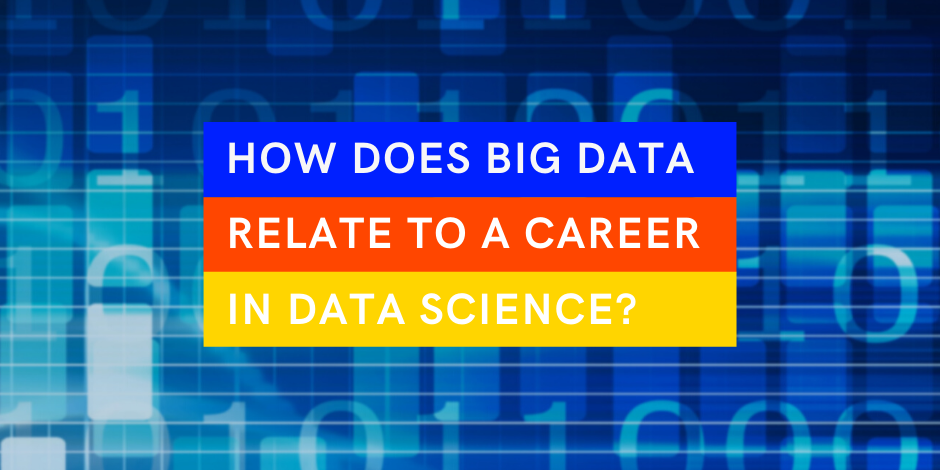What is Big Data and how is it creating career opportunities for aspiring Data Scientists?

Stay Informed With Our Weekly Newsletter
Receive crucial updates on the ever-evolving landscape of technology and innovation.
Big data is steadily becoming the most valuable global resource, more so than oil according to The Economist. Its increasing value is creating an equally strong demand for those of us who can decipher mass amounts of raw data, the data scientists.
Let’s explore the FAQs associated with launching a data science career – and the co-dependent relationship between big data and data scientists whose algorithms and analytical skills are shaping a new world.
What is Big Data?
- Big Data: An accumulation of data that is too large and complex for processing by traditional database management tools (Merriam-Webster).
What is Data Science?
- Data Science: The scientific field which seeks to extract meaningful information from large amounts of big data. Data science involves statistics, predictive analytics, machine learning and deep learning, areas which have evolved to meet the need to decipher big data sets.
Understanding how Big Data and Data Science work together
Data Science is the scientific approach to analysing big data. The aim of a data professional is to extract and understand relevant insights that can be used by key stakeholders in a variety of ways to improve products and processes.
Data scientists make sense of the tangled mess that is big data using complex and specific algorithms, advanced analytics and machine learning to unearth the knowledge big data holds.
What is Big Data’s role in creating demand for Data Science specialists?
The knowledge data scientists gather is incredibly valuable and is often used to make significant business decisions to increase the efficiency of business practices, so, companies around the world are becoming more and more data-driven to ensure they stay competitive. This has caused employers to scramble to hire skilled data professionals to preserve, and utilise the massive amounts of data currently being collected and also to make sense of historic sets of big data.
What does being a Data Scientist involve?
The processes and responsibilities of working as a data scientist:
- Define the business problem or need
- Obtain and review the data
- Process the data – this is when data is cleaned and prepared for analysis by data professionals
- Explore the data – this is where data professionals employ algorithms to try and extract meaning from the data set and make correlations/predictions
- Perform in-depth analysis – this enables data professionals to uncover hidden insights and provide stakeholders with data supported solutions
Frequently asked questions about launching a data science career
Am I suited to a data science career?
If you enjoy using your analytical skills to find data driven solutions, are excited to learn/apply new and innovative technologies to improve business processes, and you like working with key decision makers – then yes, you are suited to upskilling to data science and you will enjoy a career in the evolving data industry.
What qualifications are needed to work as a data scientist?
Previously, to become a data scientist a bachelor’s degree in information technology, computer science, engineering or a related field was a minimum requirement.
However, the booming demand for skilled data science professionals has facilitated the development of industry courses. If you enjoy a job focused learning environment – the Institute of Data full time and part time Data Science & AI programs focus on practical skills training and are delivered to you by industry experts. Learn about Alex’s upskilling journey with IOD here and Isaac’s upskilling journey with IOD here.
What are some in-demand technical skills I need to work as a data scientist?
- Python coding, SQL, and maths/stats for data science
- Ability to decipher big data sets by selecting relevant tools to identify trends/patterns
- Data modelling and visualisation techniques
- Creating machine learning and artificial intelligence algorithms
- Learning how to consult with stakeholders and present data insights in a business setting
You can also learn more about the level of maths and stats required for data science here.
I have skills in Hadoop and Spark, am I a data scientist?
No – Unfortunately, this doesn’t qualify you as a data scientist however it does help and can reinforce the learning process if you do decide to pursue a career in data science.
How can I become a data scientist from a big data background?
If you have experience working with big data, the easiest way to expand your career prospects is to focus on solving business problems using data and become qualified as a data scientist through an industry course. Short industry courses enable you to quickly demonstrate to employers that you are willing to adapt to changing job requirements.
Can I become a data scientist with no prior knowledge?
Yes – As long as you are willing to build your skills, the Institute of Data offers 12-week industry courses which will qualify and certify you as a Data Scientist with no prior knowledge required. Keep reading: Learning how to learn data science
Will my previous industry experience still be useful after I upskill to data science?
Yes – The need for data professionals is not restrictive to any one sector, skilled data professionals are in demand across the global job market. For instance, data science professionals with a background in accounting/finance, IT, engineering, health, business, consulting, HR, media/marketing, logistics, security, telecoms, academia, tourism, retail, and hospitality are all in demand.
Curious to see where a career focused on finding big data insight can take you? You could become a qualified Data Scientist with a certification through The Institute of Data in as little as 12 weeks.
Schedule a call today to learn more about fulfilling big data career opportunities or learn more here about our industry focused Data Science & AI Programs.

